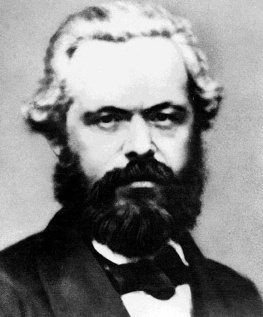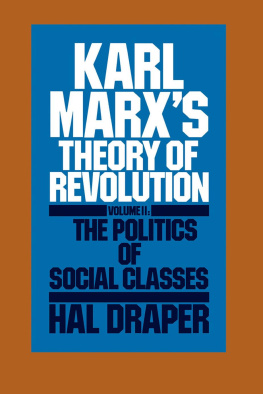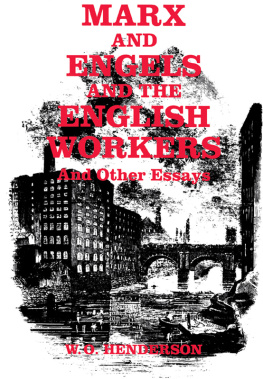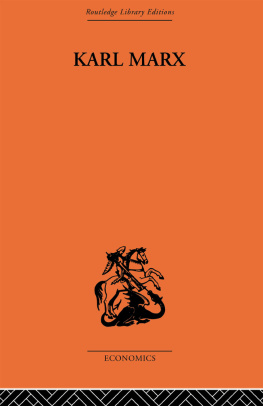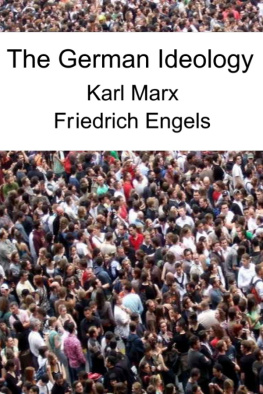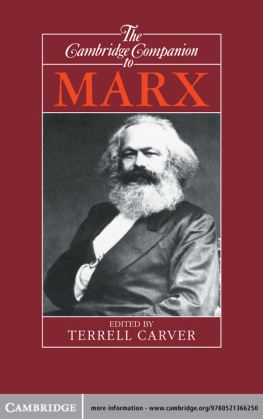David Riazanov - Karl Marx and Friedrich Engels
Here you can read online David Riazanov - Karl Marx and Friedrich Engels full text of the book (entire story) in english for free. Download pdf and epub, get meaning, cover and reviews about this ebook. publisher: MArxists Internet Archive(marxists.org), genre: Religion. Description of the work, (preface) as well as reviews are available. Best literature library LitArk.com created for fans of good reading and offers a wide selection of genres:
Romance novel
Science fiction
Adventure
Detective
Science
History
Home and family
Prose
Art
Politics
Computer
Non-fiction
Religion
Business
Children
Humor
Choose a favorite category and find really read worthwhile books. Enjoy immersion in the world of imagination, feel the emotions of the characters or learn something new for yourself, make an fascinating discovery.
- Book:Karl Marx and Friedrich Engels
- Author:
- Publisher:MArxists Internet Archive(marxists.org)
- Genre:
- Rating:4 / 5
- Favourites:Add to favourites
- Your mark:
- 80
- 1
- 2
- 3
- 4
- 5
Karl Marx and Friedrich Engels: summary, description and annotation
We offer to read an annotation, description, summary or preface (depends on what the author of the book "Karl Marx and Friedrich Engels" wrote himself). If you haven't found the necessary information about the book — write in the comments, we will try to find it.
Karl Marx and Friedrich Engels — read online for free the complete book (whole text) full work
Below is the text of the book, divided by pages. System saving the place of the last page read, allows you to conveniently read the book "Karl Marx and Friedrich Engels" online for free, without having to search again every time where you left off. Put a bookmark, and you can go to the page where you finished reading at any time.
Font size:
Interval:
Bookmark:
THE INDUSTRIALREVOLUTION IN ENGLAND.
THE GREAT FRENCH REVOLUTION AND ITS INFLUENCEUPON GERMANY.
I n KarlMarx and Friedrich Engels we have two individuals who have greatlyinfluenced human thought. The personality of Engels recedes somewhatinto the background as compared to Marx. We shall subsequently seetheir interrelation. As regards Marx one is not likely to find in thehistory of the nineteenth century a man who, by his activity and hisscientific attainments, had as much to do as he, with determining thethought and actions of a succession of generations in a great numberof countries. Marx has been dead more than forty years. Yet he isstill alive. His thought continues to influence, and to givedirection to, the intellectual development of the most remotecountries, countries which never heard of Marx when he was alive.
We shall attempt to discern the conditions and thesurroundings in which Marx and Engels grew and developed. Every oneis a product of a definite social milieu. Every genius creatingsomething new, does it on the basis of what has been accomplishedbefore him. He does not sprout forth from a vacuum. Furthermore, toreally determine the magnitude of a genius, one must first ascertainthe antedating achievements, the degree of the intellectualdevelopment of society, the social forms into which this genius wasborn and from which he drew his psychological and physicalsustenance. And so, to understand Marx -- and this is a practicalapplication of Marx's own method -- we shall first proceed to studythe historical background of his period and its influence upon him.
Karl Marx was born on the 5th of May, 1818, in thecity of Treves, in Rhenish Prussia; Engels, on the 28th of November,1820, in the city of Barmen of the same province. It is significantthat both were born in Germany, in the Rhine province, and at aboutthe same time. During their impressionable and formative years ofadolescence, both Marx and Engels came under the influence of thestirring events of the early thirties of the nineteenth century. Theyears 1830 and 1831 were revolutionary years; in 1830 the JulyRevolution occurred in France. It swept all over Europe from West toEast. It even reached Russia and brought about the PolishInsurrection of 1831.
But the July Revolution in itself was only aculmination of another more momentous revolutionary upheaval, theconsequences of which one must know to understand the historicalsetting in which Marx and Engels were brought up. The history of thenineteenth century, particularly that third of it which had passedbefore Marx and Engels had grown into socially conscious youths, wascharacterised by two basic facts: The Industrial Revolution inEngland, and the Great Revolution in France. The IndustrialRevolution in England began approximately in 1760 and extended over aprolonged period. Having reached its zenith towards the end of theeighteenth century, it came to an end at about 1830. The term"Industrial Revolution" belongs to Engels. It refers tothat transition period, when England, at about the second half of theeighteenth century, was becoming a capitalist country. There alreadyexisted a working class, proletarians -- that is, a class of peoplepossessing no property, no means of production, and compelledtherefore to sell themselves as a commodity, as human labour power,in order to gain the means of subsistence. However, in the middle ofthe eighteenth century, English capitalism was characterised in itsmethods of production by the handicraft system. It was not the oldcraft production where each petty enterprise had its master, its twoor three journeymen, and a few apprentices. This traditionalhandicraft was being crowded out by capitalist methods of production.About the second half of the eighteenth century, capitalistproduction in England had already evolved into the manufacturingstage. The distinguishing feature of this manufacturing stage was anindustrial method which did not go beyond the boundaries ofhandicraft production, in spite of the exploitation of the workers bythe capitalists and the considerable size of the workrooms. From thepoint of view of technique and labour organisation it differed fromthe old handicraft methods in a few respects. The capitalist broughttogether from a hundred to three hundred craftsmen in one largebuilding, as against the five or six people in the small workroomheretofore. No matter what craft, given a number of workers, theresoon appeared a high degree of division of labour with all itsconsequences. There was then a capitalist enterprise, withoutmachines, without automatic mechanisms, but in which division oflabour and the breaking up of the very method of production into avariety of partial operations had gone a long way forward. Thus itwas just in the middle of the eighteenth century that themanufacturing stage reached it apogee.
Only since the second half of the eighteenthcentury, approximately since the sixties, have the technical bases ofproduction themselves begun to change. Instead of the old implements,machines were introduced. This invention of machinery was started inthat branch of industry which was the most important in England, inthe domain of textiles. A series of inventions, one after another,radically changed the technique of the weaving and spinning trades.We shall not enumerate all the inventions. Suffice it to say that inabout the eighties, both spinning and weaving looms were invented. In1785, Watt's perfected steam-engine was invented. It enabled themanufactories to be established in cities instead of being restrictedto the banks of rivers to obtain water power. This in its turncreated favourable conditions for the centralisation andconcentration of production. After the introduction of thesteam-engine, attempts to utilise steam as motive power were beingmade in many branches of industry. But progress was not as rapid asis sometimes claimed in books. The period from 1760 to 1830 isdesignated as the period of the great Industrial Revolution.
Imagine a country where for a period of seventyyears new inventions were incessantly introduced, where productionwas becoming ever more concentrated, where a continuous process ofexpropriation, ruin and annihilation of petty handicraft production,and the destruction of small weaving and spinning workshops wereinexorably going on. Instead of craftsmen there came anever-increasing host of proletarians. Thus in place of the old classof workers, which had begun to develop in the sixteenth andseventeenth centuries, and which in the first half of the eighteenthcentury still constituted a negligible portion of the population ofEngland, there appeared towards the end of the eighteenth and thebeginning of the nineteenth centuries, a class of workers whichcomprised a considerable portion of the population, and whichdetermined and left a definite imprint on all contemporary socialrelations. Together with this Industrial Revolution there occurred acertain concentration in the ranks of the working class itself. Thisfundamental change in economic relations, this uprooting of the oldweavers and spinners from their habitual modes of life, wassuperseded by conditions which forcefully brought to the mind of theworker the painful difference between yesterday and to-day.
Yesterday all was well; yesterday there wereinherited firmly established relations between the employers and theworkers. Now everything was changed and the employers relentlesslythrew out of employment tens and hundreds of these workers. Inresponse to this basic change in the conditions of their veryexistence the workers reacted energetically. Endeavouring to get ridof these new conditions they rebelled. It is obvious that theirunmitigated hatred, their burning indignation should at first havebeen directed against the visible symbol of this new and powerfulrevolution, the machine, which to them personified all themisfortune, all the evils of the new system. No wonder that at thebeginning of the nineteenth century a series of revolts of theworkers directed against the machine and the new technical methods ofproduction took place. These revolts attained formidable proportionsin England in 1815. (The weaving loom was finally perfected in 1813).About that time the movement spread to all industrial centres. From apurely elemental force, it was soon transformed into an organisedresistance with appropriate slogans and efficient leaders. Thismovement directed against the introduction of machinery is known inhistory as the movement of the Luddites.
Font size:
Interval:
Bookmark:
Similar books «Karl Marx and Friedrich Engels»
Look at similar books to Karl Marx and Friedrich Engels. We have selected literature similar in name and meaning in the hope of providing readers with more options to find new, interesting, not yet read works.
Discussion, reviews of the book Karl Marx and Friedrich Engels and just readers' own opinions. Leave your comments, write what you think about the work, its meaning or the main characters. Specify what exactly you liked and what you didn't like, and why you think so.


